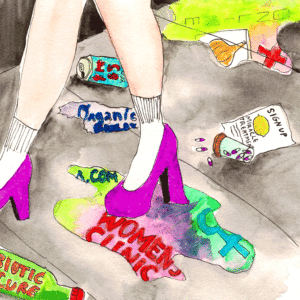Don’t Put This Up There
2018-06-12
From yogurt to oregano oil to lemon juice (OUCH!), the internet is chock-full of suggestions and remedies for women’s sexual health.
By Jen Gunter
People always want to know the most unusual object I’ve retrieved from a vagina.
I’ll never tell.
One, because the woman involved could recognize herself and feel betrayed. Yes, some items are that unusual.
The other reason is that the unfortunate sequence of events that ends with a visit to my OB-GYN practice or the emergency room is almost always the unanticipated consequence of sexual experimentation. Lots of objects seem sexually adventurous until the moment one realizes they are not. And realizes that they are stuck.
Sexual experimentation with household items is nothing new, though the nature of the object has changed slightly to match the times — think along the lines of a progression from a soda bottle to a diet soda bottle to an energy water bottle to a Kombucha bottle — over my 25 years of practice.
Another change I’ve noticed in that time is the increased touting of various “natural” and “ancient” vaginal remedies with household items. The reasons could range from “vaginal maintenance” (a term that, as an expert, I struggle to further qualify) to the treatment of yeast infections to contraception to improving sex lives.
There are two themes at play that seem simultaneously opposing yet complementary: that natural is best and that the vagina is so dirty, fragile or in need of nourishment (or all three) that it is one wrong pair of underwear or wet bathing suit away from complete catastrophe.
And this is how lemon juice (ouch), yogurt, garlic (double ouch), cucumber and oregano oil (super, mega ouch) are finding their way into vaginas worldwide. No, you are not reading a recipe for tzatziki sauce.
Many of these supposed natural therapies claim to have supporting science, although what is offered as proof is easily dismissed with a cursory knowledge of reproductive physiology. Lemon juice is recommended to acidify the vagina (it cannot). Yogurt is suggested because its bacteria could help repopulate the healthy, vaginal bacteria (commercial yogurts don’t have the right strains). Sea sponges are recommended for menstrual hygiene (testing has revealed they have bacteria and debris and they could introduce far more oxygen — a bad thing — into the vagina than a tampon or menstrual cup).
What is simultaneously fascinating and depressing is that these “newly discovered ancient therapies” are neither ancient nor effective. Instead they are the result of celebrity wellness sites, social media and even some doctors recycling material from health almanacs and digests that used to be found at the grocery store and repackaging their content under the guise of female empowerment.
What is science with its stodgy physiology and evidence-based medicine against the allure of the patient anecdote and the promise of a cure? Stories and confidence are what sells.
It’s possible that remedies like yogurt, garlic and so on were tried centuries ago as medicine, spermicide or sexual custom. But who cares if something was used historically if it has since been deemed ineffective or harmful? Blood letting for fever, mercury for vitality or syphilis, and animal dung as spermicide are all ancient medicinal practices, but that doesn’t mean we’re revisiting those therapies today.
In other words, all these so-called “ancient” sexual remedies were retired for a reason.
I get the allure. So many women are still uncomfortable speaking openly about genital health, and the internet offers privacy — not to mention community and validation. When all these needs are met, accuracy can seem secondary.
It is always best to see a health care professional for a diagnosis. We women do know our bodies, but there is so much crossover with symptoms that when women attempt self- diagnosis they are likely to misdiagnose more than 50 percent of the time. That’s worse than flipping a coin.
Researching symptoms and treatment options is always good, but to keep your internet hygiene in check (which requires far more effort than vaginal hygiene) these are the things that should send you screaming:
-
Run if the therapy is said to be “proven.” The degree to which something is supposedly “proven” to treat a medical condition is inversely proportional to the number of studies supporting that claim.
-
Run if something is being sold. Anyone selling a product is by definition biased, whether it is “Big Pharma” or “Big Natural.”
-
Run if the recommendation is homeopathic products. A recent studytells us that doctors who recommend homeopathy are more likely to deviate from standard medical guidelines. In other words they are more likely to practice bad medicine.
-
Run if the advice relies on testimonials. I would never tell my patient “Well Sarah S. said it worked for her!” Sarah S. is not the same thing as science.
-
Run if it involves inserting food vaginally for health reasons. This is nonsense.
-
Run if they recommend vaginal cleaning of any kind. For instance, I’ve been hearing about “vaginal steaming.” It’s well meaning, but woefully misinformed. If your bottom is sore, use a sitz bath.
It’s stunning that in this great age of information that can we have so much misinformation about our bodies and our sexuality. The internet has changed the speed at which we can acquire medical information, but certainly not the accuracy.
Dr. Jen Gunter is an obstetrician and gynecologist practicing in California. The Cycle, a column on women’s reproductive health, appears regularly in Styles.


